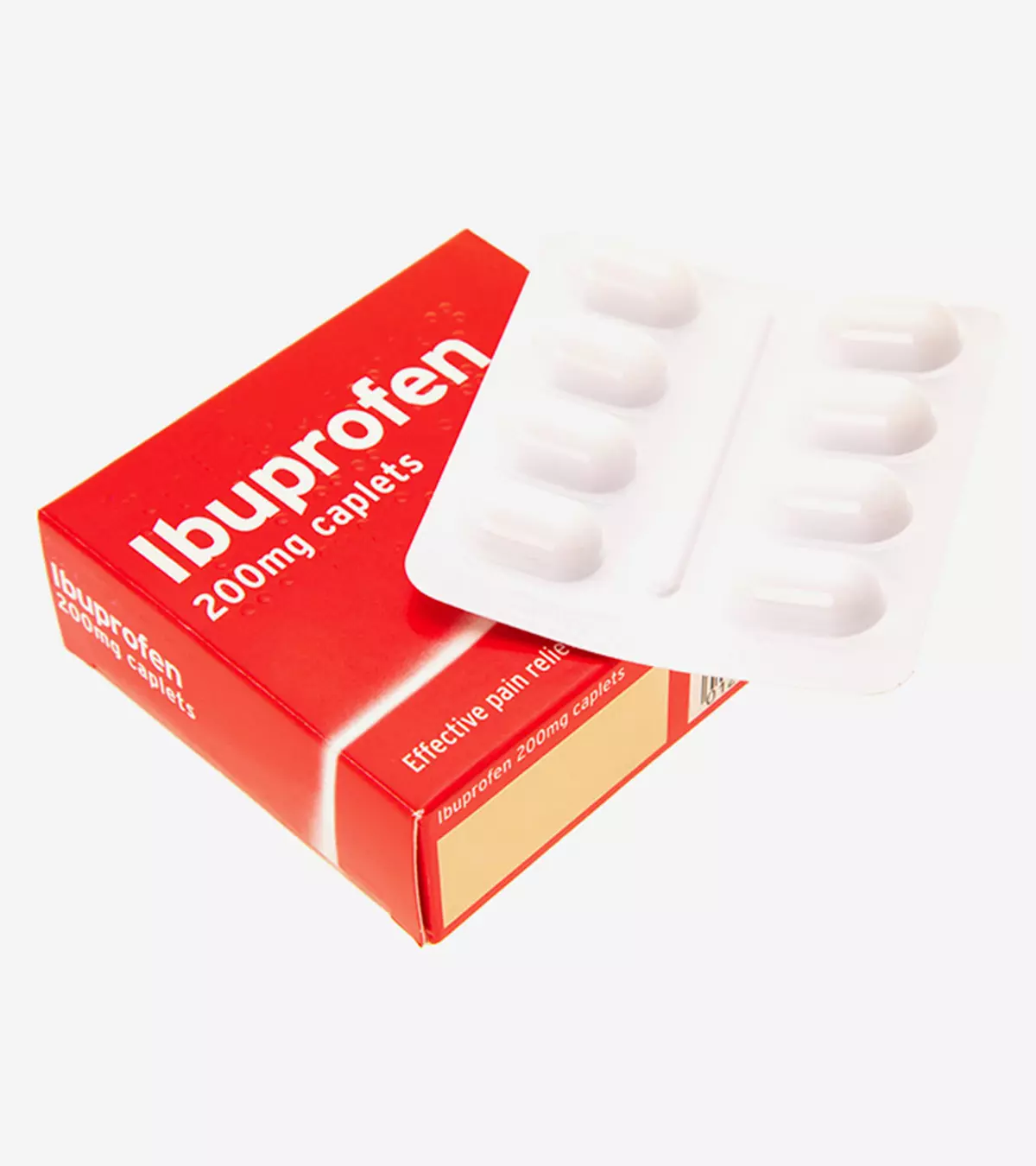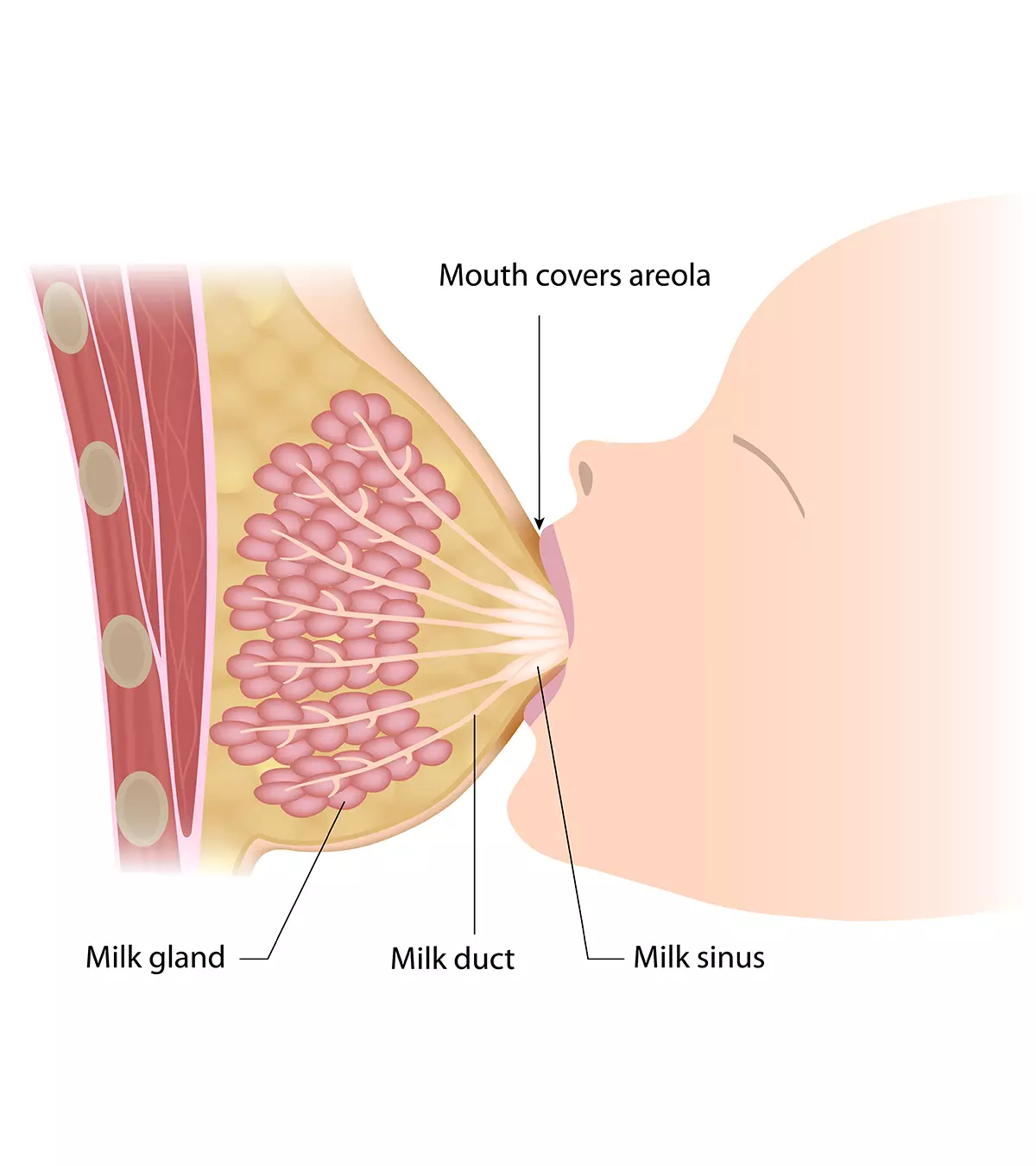
Image: ShutterStock
If you are a new mom suffering from infections such as a urinary tract infection or an uncomfortable condition such as constant diarrhea while breastfeeding, you may be quite uneasy. In such scenarios, you may consider taking medications such as Bactrim while breastfeeding. However, you need to talk to your provider before popping a pill during this crucial phase to avoid causing any potential side effects in your breastfeeding baby. Read on as we tell you the recommended doses, drug safety aspects, and possible side effects of using Bactrim while breastfeeding.

Key Pointers
- Bactrim can enter into breast milk, so caution is advised when breastfeeding.
- Consult with your doctor before taking Bactrim while nursing.
- Bactrim can be used to treat pneumonia, chronic bronchitis, diarrhea, and ear infections in breastfeeding women.
- Mothers with kidney or liver issues, low blood platelets, or anemia caused by folic acid deficiency should avoid Bactrim.
- Typical side effects of using Bactrim while nursing include nasal congestion, vomiting, appetite loss, stomach pain, rash, hives, and itching.
What Is Bactrim?

Bactrim is an effective medication and combination of antibiotics, namely trimethoprim and sulfamethoxazole, that treat several different kinds of infections that occur due to bacteria. The drug is a combination of one part of a synthetic drug popular as trimethoprim and five parts of sulfonamide drug popular as sulfamethoxazole. The unique combination of antibiotics curbs bacterial growth and cures your bacterial infection (1).
 Did You Know?
Did You Know?Is It Safe To Take Bactrim While Breastfeeding?

Understanding the implications of medications during lactation is crucial, as many drugs, including Bactrim, can affect both mother and infant. So, consult your doctor while going for Bactrim if you are breastfeeding as Bactrim passes through the breast milk and may put your newborn at risk of developing kernicterusiA complication of severe jaundice in babies, that causes bilirubin-induced brain dysfunction. (1) (10). Brittany Brown, registered dietitian and international board-certified lactation consultant, opines, “Bactrim is known to pass into breastmilk, and while it may be safe for some nursing dyads, it may not be appropriate for babies under two months of age, those born prematurely, or infants with G6PD deficiency.”
In particular, if your baby has jaundice, is stressed, is ill, or is premature, Bactrim increases the risk of accumulating high bilirubiniA yellowish pigment produced after red blood cell breakdown. levels in a baby’s blood and bilirubin displacement. Therefore, it is recommended to avoid taking Bactrim while you are nursing, especially if a baby ages two months or less (1). You should also avoid taking Bcterim when nursing if your baby is diagnosed with G6PD deficiencyiGlucose-6-phosphate dehydrogenase (G6PD) deficiency is a genetic disorder that prevents the body from producing enough of the enzyme G6PD, which protects the red blood cells from breaking down easily. (11). However, the American Academy of Pediatrics has recommended Bactrim (Trimethoprim/sulfamethoxazole) as one of the drugs to be given to nursing mothers with healthy full-term infants (12).
Childbirth & breastfeeding educator Mindy Cockeram says, “Although an extensive systematic review of the use of sulfonamides (like Bactrim) during breastfeeding found no adverse reactions in infants, parents of a baby that is exhibiting jaundice, ill, stressed, or premature should avoid Bactrim because of the increased risk of an increase in bilirubin buildup.”
Additionally, you should not take Bactrim if you have a critical kidney or liver ailment, have a history of low blood platelets due to trimethoprim, and have anemia due to folic acid deficiency. Consult your pediatrician before you go for the drug while breastfeeding (1).
 Research finds
Research findsWhy Is Bactrim Used When Breastfeeding?
Bactrim is an excellent combination of antibiotics that can relieve several bacterial infections while you are nursing your baby. Here, we list some bacterial infections in nursing mothers that Bactrim can help treat:
1. Urinary tract infections (UTI)
Bactrim is an effective cure for urinary tract infections due to bacteria, such as E.coli, Morganella morganii, Proteus Vulgaris, Proteus mirabilis, Klebsiella, and Enterobacter (1). The drug interaction relieves the symptoms of UTI, such as a burning sensation while urinating, cramps in lower abdomen, foul-smelling urine, frequent urination, and blood in the urine. Nursing mothers should ensure adequate fluid intake and urinary output to prevent the risk of crystalluriaiThe presence of urine crystals indicating kidney inflammation while taking Bactrim to treat a UTI. Alternatively, they can be prescribed other medications, such as ciprofloxacin, ofloxacin, and nitrofurantoin, if Bactrim is contraindicated (13).
2. Ear infections

Bactrim helps treat ear infections due to bacteria, such as Haemophilus influenzae and Streptococcus pneumonia. However, lactating mothers should consult the obstetrician before taking the medication to cure any ear infection (2). Also, it is important to note that prolonged and prophylactic use of Bactrim is not recommended.
3. Chronic bronchitis

Chronic bronchitis is one of the most severe respiratory issues, which only gets worse when it is due to Haemophilus influenzae or Streptococcus pneumonia. However, having an appropriate dose of Bactrim helps you cure this ailment effectively (3).
4. Diarrhea
Bactrim provides nursing moms relief from diarrhea and stomach upset due to Shigella sonnei infections, Shigella flexneri, enterotoxigenic E. coli, and traveler’s diarrhea (1).
5. Pneumonia
Bactrim helps treat pneumonia that occurs due to Pneumocystis jiroveci (1).
The medication can also boost your immune system considerably.
What Are The Side Effects Of Bactrim When Breastfeeding?

Even though there are many benefits of having Bactrim, there is always a possibility that you may experience some side effects of the drug. Here are some common side effects of the medication (4) (14):
- Nausea
- Vomiting
- Anorexia or loss of appetite
- Stomach ache
- Skin rashes or allergies
- Hives
- Itchiness
- Cough
- Diarrhea
- Muscle ache
- Sore throat
- Ulcers
- Painful urination
- Yellowing of eyes or skin
- Irritated eyes
- Unusual and random bruises and bleeding
If you experience any of these side-effects while breastfeeding your infant, stop taking the medication and check with your doctor as soon as possible.
Frequently Asked Questions
1. How long will it take for Bactrim to leave my system?
Bactrim contains trimethoprim and sulfamethoxazole. The half-life (time needed for the medication to reduce to half the original dose) of trimethoprim is about eight to ten hours, and that of sulfamethoxazole is ten hours. However, people with renal issues may show elevated half-lives for both, and the drug may take a few days to clear from their system. Doctors may adjust the medication dosage if you have these issues (4).
2. Will Bactrim decrease my milk supply?
Presently, there is not enough research to confirm the effects of Bactrim on your milk supply. However, according to the CDC, most prescription drugs do not affect the milk supply. Nevertheless, seek your doctor’s advice before taking this antibiotic during breastfeeding (5) (6).
3. How long do antibiotics remain in breast milk?
Different antibiotics pass into the breast milk in different amounts. Therefore, not all antibiotics are safe during breastfeeding (7). In the case of Bactrim, a small study on 20 breastfeeding women shows that the drug peaks in the breast milk three hours after consumption (6). Therefore, doctors usually prescribe medications that pass into the milk at low levels and do not adversely affect the infants. So, it is important to consult your doctor before taking any antibiotics while pregnant or during breastfeeding.
4. Are there any foods I avoid while taking Bactrim?
It is recommended to consume a safe, balanced diet to prevent any damaging side effects of Bactrim. Dairy, calcium-rich foods, fortified foods, and high-acid foods may interfere with antibiotics. Instead, include soups, lightly salted crackers, peanut butter, and fermented foods in your diet (8).
The medication Bactrim is an antibiotic used to treat several bacterial infections. However, a few studies state that the medication might pass through breast milk. Therefore, medical professionals may or may not advise Bactrim while breastfeeding. Consult your doctor if you show any signs of any infections rather than taking the medication by yourself. Follow the doctor’s advice on taking the medications. If you notice any side effects or doubt it affects your nursing, stop its intake and consult your doctor for an alternative medication.
Infographic: Precautions For Bactrim Intake During Breastfeeding
Although Bactrim is generally a safe antibiotic for breastfeeding women, there are certain restrictions and cautions to be considered to prevent the side effects. The infographic below provides a checklist of all the essential precautionary measures. Use it to ensure the safe usage of the antibiotic for you and your baby.
Some thing wrong with infographic shortcode. please verify shortcode syntaxIllustration: Is It Safe To Take Bactrim While Breastfeeding?

Image: Dall·E/MomJunction Design Team
You may be wondering about what antibiotic can help treat bacterial infections while breastfeeding. The following video contains a few answers to this question.
References
- BACTRIM™ sulfamethoxazole and trimethoprim DS (double strength) tablets and tablets USP.
https://www.accessdata.fda.gov/drugsatfda_docs/label/2010/017377s067lbl.pdf - Bactrim.
https://www.lb7.uscourts.gov/documents/Bactrim.pdf - LABEL: BACTRIM DS- sulfamethoxazole and trimethoprim tablet.
https://dailymed.nlm.nih.gov/dailymed/drugInfo.cfm?setid=0138a156-859a-48a3-bf5a-e2db0cc7f2f9 - Sulfamethoxazole; Trimethoprim Tablets
https://my.clevelandclinic.org/health/drugs/19613-sulfamethoxazole-trimethoprim-tablets - Bactrim.
https://www.accessdata.fda.gov/drugsatfda_docs/label/2010/017377s067lbl.pdf - Trimethoprim-Sulfamethoxazole
https://www.ncbi.nlm.nih.gov/books/NBK501289/ - Prescription Medication Use.
https://www.cdc.gov/breastfeeding-special-circumstances/hcp/vaccine-medication-drugs/prescriptions.html?CDC_AAref_Val=https://www.cdc.gov/breastfeeding/breastfeeding-special-circumstances/vaccinations-medications-drugs/prescription-medication-use.html - Antibiotics and Breastfeeding.
https://www.breastfeedingnetwork.org.uk/factsheet/antibiotics/ - Antibiotics: Foods to Eat & Foods to Avoid;
https://samhealth.org/news/antibiotics-foods-to-eat-and-foods-to-avoid/ - Sulfamethoxazole/Trimethoprim (Bactrim or Septra)
https://www.ncbi.nlm.nih.gov/books/NBK582966 - Trimethoprim With Sulfamethoxazole.
https://www.kemh.health.wa.gov.au/~/media/HSPs/NMHS/Hospitals/WNHS/Documents/Clinical-guidelines/Obs-Gyn-MPs/Trimethoprim-Sulfamethoxazole.pdf?thn=0 - The Transfer of Drugs and Other Chemicals Into Human Milk.
https://alabamabreastfeeding.org/wp-content/uploads/AAP-The-Transfer-of-drugs-and-Chemicals-into-Human-Milk.pdf - Which UTI therapies are safe and effective during breastfeeding?
https://cdn.mdedge.com/files/s3fs-public/Document/September-2017/5603JFP_ClinicalInquiries3.pdf - Sulfamethoxazole and trimethoprim (oral route)
https://www.mayoclinic.org/drugs-supplements/sulfamethoxazole-and-trimethoprim-oral-route/description/drg-20071899
Community Experiences
Join the conversation and become a part of our nurturing community! Share your stories, experiences, and insights to connect with fellow parents.
Read full bio of Dr. Dur Afshar Agha

Brittany Brown is a dietitian, lactation consultant, and wellness advocate based in Nova Scotia, Canada. With over a decade of experience, she empowers families with evidence-based support in infant nutrition, breastfeeding, and mindful feeding. Passionate about community and holistic health, Brittany helps parents navigate feeding with confidence and clarity, ensuring every family feels nourished and supported on their journey.
Brittany Brown is a dietitian, lactation consultant, and wellness advocate based in Nova Scotia, Canada. With over a decade of experience, she empowers families with evidence-based support in infant nutrition, breastfeeding, and mindful feeding. Passionate about community and holistic health, Brittany helps parents navigate feeding with confidence and clarity, ensuring every family feels nourished and supported on their journey.
- Mindy Cockeram is a board-certified lactation consultant and runs her private practice in South Carolina. She trained as an antenatal teacher with the National Childbirth Trust (NCT) in London, England and taught childbirth classes for the NCT and St Georges Hospital Trust. Later, she relocated to the US.
 Mindy Cockeram is a board-certified lactation consultant and runs her private practice in South Carolina. She trained as an antenatal teacher with the National Childbirth Trust (NCT) in London, England and taught childbirth classes for the NCT and St Georges Hospital Trust. Later, she relocated to the US.
Mindy Cockeram is a board-certified lactation consultant and runs her private practice in South Carolina. She trained as an antenatal teacher with the National Childbirth Trust (NCT) in London, England and taught childbirth classes for the NCT and St Georges Hospital Trust. Later, she relocated to the US.
Read full bio of Jessica Albert
Read full bio of Rohit Garoo
Read full bio of Vidya Tadapatri


















